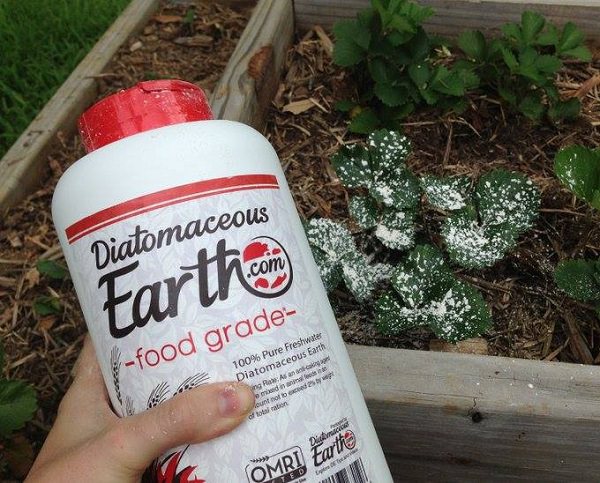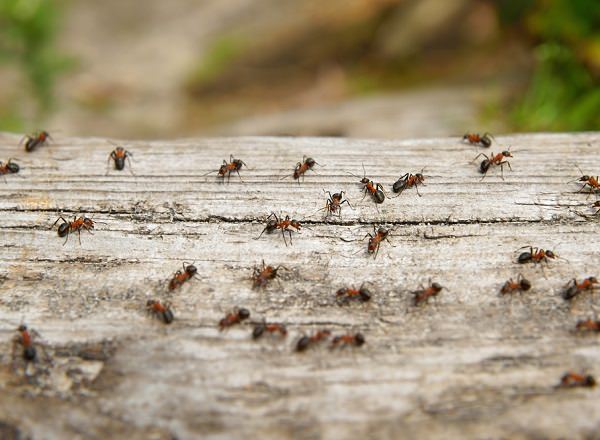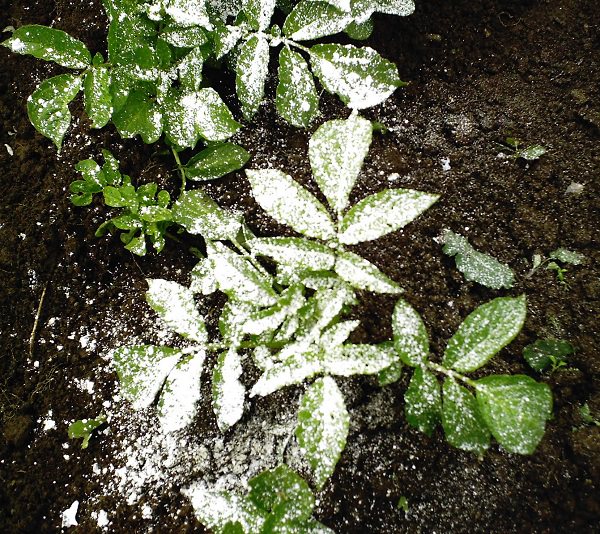This naturally occurring substance can be used for so many things in the garden. Must check out these 13 Diatomaceous Earth Uses to learn more!
Click here to learn more about Diatomaceous Earth!
1. Eliminate Gnats
You can find these small, winged insects in crammed-up spots like garbage dumps, stale vegetables, overripe fruits, over-watered soil as well as potted plants with decaying soil. Basically, anything wet or damp forms a suitable habitat for these pests. Sometimes when you buy potted plants, they come with a batch of pesky gnats that lay eggs in the soil and feed on algae, fungi and decaying plant matter present in the soil. They are damaging to plant’s health.
Diatomaceous earth can help you to get rid of them. Just dust your potted plants with DE to keep the topsoil dry and desiccate gnats or larvae that land on the plant. When you water your plants, add some more DE to the soil again. This small measure goes a long way to tackle a severe gnat problem, in addition to a few other insects such as blackflies, whiteflies, and other flying insects. Here’s an article on it in detail!
Also Read: Castile Soap Uses in Garden
2. Deter Wasps & Hornets
It’s important to emphasize that wasps too play a vital role in maintaining the natural balance of your garden and devouring pests like caterpillars and aphids. However, if there is a wasp population in your garden you can’t live with, you may need to get rid of them.
Thankfully, Diatomaceous earth is an effective wasp killer. Just apply a fair amount of DE in areas where wasps have caused a problem and make sure to provide sufficient coverage. It’s advisable to use the wet application if the climate is dry where you live. Research has shown that wasps and hornets do not build nests on DE-treated areas. Repeat this process every three weeks for continual prevention.
Also Read: 7 Wasp Trap Ideas
3. Get Rid of Flies
Flies can be incredibly frustrating. These teeny-weeny creatures feast on your valuable garden edibles and impact your plants’ health negatively, hence your best bet is to reduce, if not eliminate their colonization in your garden. Instead of using counter-productive chemical pesticides, use diatomaceous earth around the yard and farm to repel away flies naturally. Moisture and smell attract flies, but the use of DE prevent them effectively. Check out this article on Mother Earth News and this one too, for help.
Also Read: Amazing Natural Pesticide Recipe
4. Get rid of Maggots
Unused piles of manure and compost often house the larvae of several types of flies that infest them. Some of these, like the soldier fly, are largely harmless as they neither sting nor spread infectious disease. But unless you are sure of them, or have a coop of chickens to tackle the maggot problem for you, you might want to eliminate them as fast as you can. If you are all for organic products and hate the idea of subjecting your garden to harsh chemicals, then the diatomaceous earth is most probably your best bet. Just apply it all over the affected area and let it do its job.
Also Read: How to Get Rid of Maggots
5. Keep Slugs Out of Your Garden
Apply food grade DE in a circle the plants to keep these pests away from feeding on your plants. This will repel them. Also, the sharp and ultra-fine silica particles in DE penetrate and inflict lethal cuts on the soft, tender bodies of these pests and distress them.
Also Read: Slug Control Tips
6. Protect Your Home from Termites
One of the best ways to protect your home from termite colonies is to preclude them from entering in the first place. These pests basically lurk in the dark corners of your garden, where they serve an important role in breaking down decaying plant matter and digesting wood to form soil. Termites typically create the biggest problems during the swarming season, when they multiply quickly and infest your home interiors as well.
If you live in a place where termites are common, you probably know the harm they can cause. Well, Diatomaceous earth is an effective thing to help you in both preventing, as well as removing termite colonies. It’s economical, chemical-free, and easy to apply! Don’t forget to read this article in detail on eHow.
7. Destroy Ant Hills & Trails
Ants swarm the family picnic, garden tea party, backyard BBQ, and whatever little food they can get their tiny legs on. So, cleaning up what’s bringing them into your garden is half the battle won. The other half can be won by using diatomaceous earth, as it’s a natural ant repellent that works in a non-toxic, human-friendly way to disrupt non-discernible ant trails and prevent future ant problems. And all that too without contaminating your ornamentals and edibles! Simply, dust the plants and anthills with DE to get rid of them.
Also Read: 30 Effective Ways to Deter Ants
8. Increase the Porosity of Soil
While it doesn’t offer much regarding nutrition, it does have the capacity to retain fertilizers and release it gradually to the roots. That, coupled to its porosity makes it a wonderful addition to the soil for container gardening and a good growing medium for bonsai and hydroponic culture. Just mix it with potting soil to improve drainage and air flow in the root zone.
Also Read: Use Epsom Salt for Cucumbers
9. Preserve and Dry Flowers

If you want to preserve and dry your favorite blooms, use Diatomaceous Earth. It can help you preserve some of the best specimens from your gardening venture, as well as the most colorful flowers of Spring, including tulips, lilacs, Iris, and of course, roses. Here’s a step by step article on this to read.
Also Read: Gardener’s Guide on Companion Plants for Iris
10. Deodorize Pest-Attracting Litter
In addition to acting as a mechanical pesticide, one of the most important diatomaceous earth uses in the garden is eliminating noxious odors. If you have a pet that tends to use the garden as its toilet, ensure to mix in some DE onto the topsoil or just apply it liberally over its favorite place. Also, using diatomaceous earth helps to deodorize the compost pile and keep it from acting as a potential habitat for nuisance pests.
Also Read: DIY Mosquito Repellent Candles
11. Control Aphids
Aphids are the most prominent pests gardeners have to fight continuously. When overlooked, they multiply rapidly and cause widespread damage to the garden in no time. Diatomaceous earth is an effective solution to get rid of aphids. Simply dust the infested area with the dry powder, or mix it with some water and apply with a sprayer. Repeat the procedure every few days for better results.
12. Get Rid of Rodents
Rodents like mice, moles, rats, and rabbits can wreck your garden in no time, and if you don’t want to kill them, diatomaceous earth is here to help. Rodents hate the powerful smells of essential oils like peppermint and lemon citrus and as you might already know that diatomaceous earth is an excellent absorbent. These two ingredients can be combined to create the most potent organic rodent repellent that can keep the rodents at bay.
The best thing is that it is highly cost-effective, is completely safe and at the same time smells heavenly. Check out the recipe here.
13. Reduce Tick Population
Summer is commonly signified by warm, sultry weather, bright flowers swaying in the gentle breeze and large colonies of blood-sucking, parasitic arachnids, i.e., ticks. If you enjoy hiking, gardening, and playing in the backyard, you must have encountered these pesky little suckers. They are tough to handle once they attach themselves to your body. Plus, they often transmit incurable disease like Tularemia, Lyme disease, Rocky Mountain spotted fever, and so on. One way to deal with their infestation is to dust the entire yard and lawn with a generous amount of diatomaceous earth. It’s advisable to use an applicator for this purpose and repeat the process once every month during the flea season.









I think that you should mention that a person should wear a mask as you don’t want to breathe in any dust from this stuff. It will damage your lungs if you breathe it in.
not with food grade.
Yes Barbara is correct.
Every kind of D.E. is dangerous to inhale.
Thanks for these useful tips!
One of my problems in summer is the insufferable insect bites I get whenever I go outdoors.The stings, itchiness, and scars left on my skin.
Barbara Simoes, if using food grade Diatomaceous Earth you don’t need a mask. It is perfectly safe for humans and pets.
Not so! Food grade DE can be ingested safely but still poses a danger to your lungs if inhaled.
True – definitely should use caution re: breathing it in, food grade or otherwise.
I live on Cape Cod and we have these red beetles. They have sort of a more oval shape to them instead of being round like a ladybug. They love to eat Lilies, especially Easter Lilies……that is until I sprinkled Diatomaceous Earth on them. I read the only thing to get rid of these beetles are Wasps, and who wants Wasps in their flower garden? I sprinkle some Diatomaceous Earth on my Lilies as soon as I see them pop up. If it rains I reapply. I just tried this method last year, and last year was the first year all my Lilies came to bloom in many, many years.
I’m so confused! I want to use DE in my yard. If I apply it dry, and then it rains (or otherwise gets wet), I need to reapply. HOWEVER, I can apply DE mixed with water to the entire lawn, as well? I must be missing something. Does anyone know why you can apply it wet but if it’s dry and gets wet it must be reapplied?
yes u can mix DE with water to spray the leaves (specially the back of the leaves), and when it gets dry, the DE powder will still attach to the leaves and the bug will eat DE and so on… its all about logic, isnt it..?
I read diatimaceous earth does not work when it is wet, which is why you ŕeapply after it rains. Do not use a sprayer mixed with DE and water. I think people are confused. DE can be applied with a plant duster but not a plant sprayer.
I have a question from reading this article. Diatomaceous earth kills slugs that come in contact with it by penetrating them with lethal cuts. Is that what happens to our lips, mouth, tongue, and throat area when we ingest diatomaceous earth slurry? Or does it work for slugs because the diatomaceous earth absorbs their slime, so to speak, then it cuts them from there?
Can you put diatomaceous on flowers such as new verbena plants for slugs?
Thanks Kathy
Diatomaceous earth is safe for any plants. Make sure you use food grade.
Diatomaceous earth is mostly made up of silicon and calcium. Both of these minerals are important for the body and the non organic vegetables you buy today at stores are lower in these 2 minerals than they were 50 or more years ago because of mineral depletion of the soil and the use of synthetic fertilizers rather than natural fertilizers like manure and compost. Silicon is a mineral that helps your body to absorb other minerals and calcium is necessary for healthy bones and the prevention of osteoporosis. Always make sure you use food grade. if you suffer from acid reflux you can mix a small amount in water and drink it on a regular basis.
My husband thinks you can rub this on dogs to get rid of fleas. I don’t think so but would like any opinions. Thank you
food grade will not poison them or us. the eggs will hatch larva and the emerging fleas will soon die before becoming adults and thereby stopping the cycle. about two or three weeks and no large fleas. as the cycle plays out after more time there may be few fleas at all. licking may help with worm elimination. the down side is dust. i know the statements made, but fleas in hot weather are hellish to deal with. i hope my lungs can take some DE dust infrequently because i can’t take the flea life at all. so you may not believe how well it works till you have used it for a few months. it is amazing. 5o lbs. food grade diatomaceous earth will be the lowest cost and best gift for safer insect control in your life. drink some with water at least once just to see how neutral it taste. put it around walks, doors, on plants, any lawn areas where any pets are. except snails and ant farms. bedding and floors too. once a week dip into the bag with drinking cup and have a party where it seems best. it gets walked around. in two months wearing white socks if you can’t tell the difference reply here. i want to know. me and my cats probably are inhaling some. they probably are licking it. if after all the smoke and sheet rock dust i have had to breath and DE scars my lungs to eliminate all the bugs that ruin my life just so for me. so it’s every where. home, garden, where they poop, garbage cans, porch, vacuum, broom bristles and more. it’s a miracle.
Yes it will kill fleas on the dog
I am having a spider mite? Problem with my succulents, the white, cotton-like gunk that accumulates in the deep spaces between the leaves is impossible to get rid of! I’ve been told to manually remove this stuff, use a strong hose spray, etc. Doesn’t work! Can I use a de water mix or and a light dusting without damaging the plant?